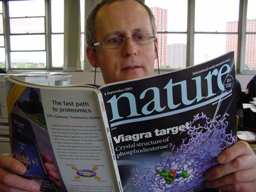Virtuous virtual
 Correspondence continues to tumble in about the role and importance of fieldwork in the undergraduate curriculum, following Mark Brodie’s incendiary suggestions in the Soapbox column back in August.
Correspondence continues to tumble in about the role and importance of fieldwork in the undergraduate curriculum, following Mark Brodie’s incendiary suggestions in the Soapbox column back in August.
There are two main threads. One says that industry needs people who are familiar with geology in the field to be sure that they are grounded in reality and not basing their ideas on fantasies. I have some personal experience of this. My last act of geological fieldwork, long ago on the Tertiary sediments of the Batinah Coast, Oman, involved working with two others, one of whom specialised in such things and took the scientific lead. His job was to draw all our logs and observations together into a sedimentological model for presentation to our oil-industry client. Trouble was, sedimentological models filled his mind.
We found ourselves once staring at a fine escarpment, whose bright white and nearly horizontal capping limestone lay over incompetent marls that were collapsing in a series of rotational slips. An incipient slip just beginning gave the illusion of a slight angular unconformity. But instead of this reality, he recognised a textbook cartoon of syn-sedimentary shelf-edge disconformities (which, naturally, fitted his model).
It took a lot to talk him out of this convenient fantasy, even after I had made him climb the scarp, and shown him how the slips repeated the sequence, bedding planes in the oldest of them being turned from near horizontal to near vertical at the foot. My verdict on his fieldworking abilities at the time was less than charitable, but now I know that it was probably just lack of experience in the field. He hadn’t seen enough rocks.
The second theme centres on the fear that the young are becoming divorced from reality, retreating via their i-phones into a virtual on-line existence and losing interest in reality altogether. This is potentially a much more serious and widespread problem with possibly grave consequences for recruitment. You can read all these at full length online.
However, this month in our second feature, Greg Power & Rob Barnes present an example of how new technology can help breathe new life into old data collected by students in the field over many years. We do not wish to suggest that all new technology is A Bad Thing – that would be luddite – but we do need to show discrimination. Things are not all good merely because they are novel, any more than they are all bad.
Dr Ted Nield FGS
EDITOR